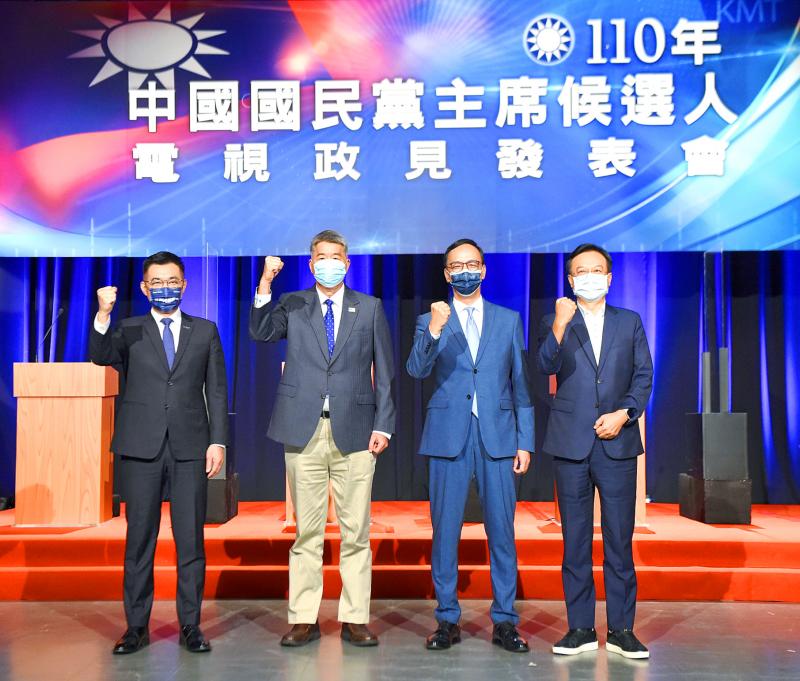The four candidates vying for the position of Chinese Nationalist Party (KMT) chairperson yesterday took part in a televised policy presentation appealing for party members’ support.
Incumbent KMT Chairman Johnny Chiang (江啟臣) pledged that he would not run for president on the party ticket in 2024 and would rather serve as a “kingmaker,” adding that voting for him to lead the party for a second term meant embracing the future.
There should be more options regarding the cross-strait issue, he said.

Photo: Fang Pin-chao, Taipei Times
Both sides of the Taiwan Strait need to find ways to sit and talk things over, Chiang said, adding that, most importantly, peace and safety should be maintained across the Strait.
The KMT needs to “walk the walk” and provide more opportunities for young people, he said.
The party culture of older members lecturing younger members needs to change, or else young people would find it difficult to accept the KMT, Chiang said.
Former New Taipei City mayor Eric Chu (朱立倫), who was elected KMT chairman in an unopposed by-election in January 2015 and resigned in January 2016 following the party’s losses in the presidential and legislative elections, said that the KMT needs a chairperson who can consolidate the party against the Democratic Progressive Party.
“No one can claim to be a ‘kingmaker’ in 2024; only a strong KMT can be a ‘kingmaker,’ whereas a weak KMT will only unmake kings,” he said, in apparent reference to Chiang’s remarks.
The KMT’s core tenets are the same as that of Sun Yat-sen (孫逸仙) and former president Chiang Ching-kuo (蔣經國), Chu said, adding that the KMT is the successor to the very spirit that founded and defended the Republic of China.
The KMT must resume cross-strait interactions as the KMT’s participation in such forums enable the public to see that the KMT is trying to foster regional peace, prosperity and safety for the next generation, he said.
Chu added that if he was elected, he would let young people know that the KMT loves Taiwan and supports freedom and democracy, adding that under his leadership, the KMT would create more opportunities for young people.
Sun Yat-sen School president Chang Ya-chung (張亞中) accused Chu and Chiang of making empty promises and not offering anything tangible.
Chang said that if elected, he would seek dialogue with Beijing regarding the signing of a peace treaty, as long as the KMT became the ruling party in 2024.
The KMT has lost its “soul” and “ideals,” with its leaders concerned only for themselves or their factions, he said, adding that only if the KMT moves forward would any young people consider joining.
Former Changhua County commissioner Cho Po-yuan (卓伯源) said the party chairperson must be professional and selfless, so that young people feel they are receiving the party’s attention and respect.
Cho said that if elected, he would invite Chinese President Xi Jinping (習近平) to visit Taiwan and hold a cross-strait political summit in Taiwan.
The KMT chairperson election is scheduled for Sept. 25, after being postponed from July 24 due to a COVID-19 outbreak.

Taiwan has received more than US$70 million in royalties as of the end of last year from developing the F-16V jet as countries worldwide purchase or upgrade to this popular model, government and military officials said on Saturday. Taiwan funded the development of the F-16V jet and ended up the sole investor as other countries withdrew from the program. Now the F-16V is increasingly popular and countries must pay Taiwan a percentage in royalties when they purchase new F-16V aircraft or upgrade older F-16 models. The next five years are expected to be the peak for these royalties, with Taiwan potentially earning

STAY IN YOUR LANE: As the US and Israel attack Iran, the ministry has warned China not to overstep by including Taiwanese citizens in its evacuation orders The Ministry of Foreign Affairs (MOFA) yesterday rebuked a statement by China’s embassy in Israel that it would evacuate Taiwanese holders of Chinese travel documents from Israel amid the latter’s escalating conflict with Iran. Tensions have risen across the Middle East in the wake of US and Israeli airstrikes on Iran beginning Saturday. China subsequently issued an evacuation notice for its citizens. In a news release, the Chinese embassy in Israel said holders of “Taiwan compatriot permits (台胞證)” issued to Taiwanese nationals by Chinese authorities for travel to China — could register for evacuation to Egypt. In Taipei, the ministry yesterday said Taiwan

Taiwan is awaiting official notification from the US regarding the status of the Agreement on Reciprocal Trade (ART) after the US Supreme Court ruled US President Donald Trump's global tariffs unconstitutional. Speaking to reporters before a legislative hearing today, Premier Cho Jung-tai (卓榮泰) said that Taiwan's negotiation team remains focused on ensuring that the bilateral trade deal remains intact despite the legal challenge to Trump's tariff policy. "The US has pledged to notify its trade partners once the subsequent administrative and legal processes are finalized, and that certainly includes Taiwan," Cho said when asked about opposition parties’ doubts that the ART was

If China chose to invade Taiwan tomorrow, it would only have to sever three undersea fiber-optic cable clusters to cause a data blackout, Jason Hsu (許毓仁), a senior fellow at the Hudson Institute and former Chinese Nationalist Party (KMT) legislator, told a US security panel yesterday. In a Taiwan contingency, cable disruption would be one of the earliest preinvasion actions and the signal that escalation had begun, he said, adding that Taiwan’s current cable repair capabilities are insufficient. The US-China Economic and Security Review Commission (USCC) yesterday held a hearing on US-China Competition Under the Sea, with Hsu speaking on